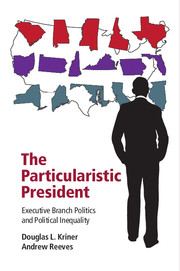Book contents
- Frontmatter
- Contents
- List of Tables
- List of Illustrations
- Acknowledgments
- 1 Introduction
- 2 The Origins of Presidential Particularism
- 3 Base Closings and Trade
- 4 Disaster Declarations and Transportation Grants
- 5 Federal Grants and Presidential Particularism
- 6 The Electoral Rewards of Presidential Particularism
- 7 Conclusion
- Appendix A Technical Appendix to Chapter 3
- Appendix B Technical Appendix to Chapter 4
- Appendix C Technical Appendix to Chapter 5
- Appendix D Technical Appendix to Chapter 6
- References
- Index
2 - The Origins of Presidential Particularism
Published online by Cambridge University Press: 05 June 2015
- Frontmatter
- Contents
- List of Tables
- List of Illustrations
- Acknowledgments
- 1 Introduction
- 2 The Origins of Presidential Particularism
- 3 Base Closings and Trade
- 4 Disaster Declarations and Transportation Grants
- 5 Federal Grants and Presidential Particularism
- 6 The Electoral Rewards of Presidential Particularism
- 7 Conclusion
- Appendix A Technical Appendix to Chapter 3
- Appendix B Technical Appendix to Chapter 4
- Appendix C Technical Appendix to Chapter 5
- Appendix D Technical Appendix to Chapter 6
- References
- Index
Summary
The political scientist Harold Lasswell famously defined politics as who gets what, when, and how. On these questions, the universalistic presidency framework and the vision of a particularistic presidency that we offer in its place yield starkly diverging expectations. When making major policy decisions and deciding how to allocate federal resources across the country, do presidents prioritize the needs and desires of some constituencies over others? The universalistic presidency framework argues no. Presidents, alone in our system, possess a truly national constituency. As such, they are uniquely positioned to pursue nationally optimal policy outcomes. Unlike members of Congress, they know that their lasting legacy will be measured by how they served the national interest, not how they balanced such imperatives with the need to serve a more narrow geographic constituency.
We do not dispute that presidents are motivated by an intense desire to champion and implement policies that benefit the nation as a whole. However, we argue that presidents also have strong incentives to be particularistic – that is, to weigh the needs and desires of some Americans more heavily than others when forming their policy priorities. The incentives driving particularistic behaviors are multiple. For example, electoral motivations drive presidents to respond disproportionately to the interests of voters in constituencies with the most clout in the next presidential contest. Moreover, presidents are more than reelection seekers; they are also partisan leaders. As such, presidents routinely prioritize the needs of their partisan base over those of constituencies that reliably back the partisan opposition. As party leaders, presidents reliably move to channel federal benefits to constituencies that send co-partisan legislators to Washington.
The differences between the universalistic and particularistic paradigms are not merely theoretical or semantic. Rather, they have serious, tangible consequences for public policymaking in America. Left to their own devices, presidents do not simply pursue policies that maximize benefits for the entire nation.
- Type
- Chapter
- Information
- The Particularistic PresidentExecutive Branch Politics and Political Inequality, pp. 29 - 49Publisher: Cambridge University PressPrint publication year: 2015

